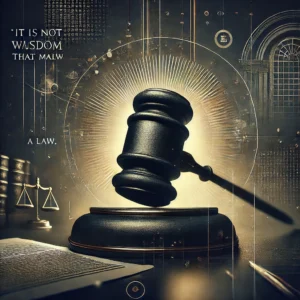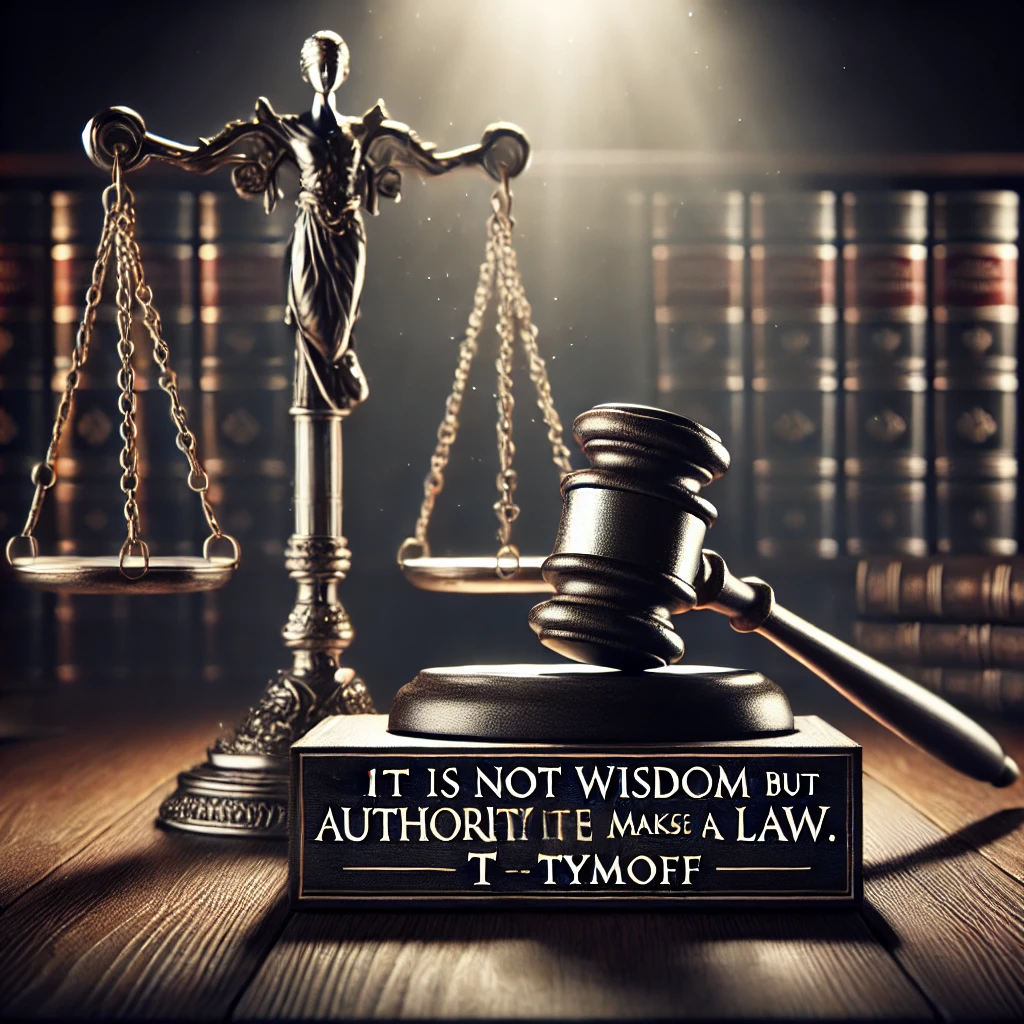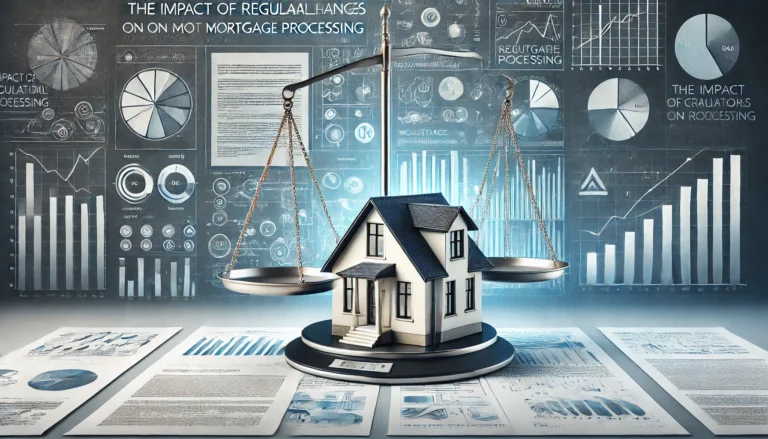In a world shaped by rules and regulations, the laws that govern our daily lives often stem from authority rather than collective wisdom. This distinction between authority and wisdom in lawmaking is essential to understand. Authority dictates how laws are formed and enforced, while wisdom is about what is just, fair, and beneficial for society. As the quote by Tymoff suggests, “it is not wisdom but authority that makes a law. t – tymoff”—a profound observation that reveals the tension between power and knowledge in lawmaking.
Historical Context of Law and Authority
The creation of laws has always been closely linked with authority. From the earliest civilizations, such as those in Mesopotamia and Egypt, the law was dictated by rulers—kings, pharaohs, and other powerful figures. These rulers had absolute authority, and their decrees shaped the lives of their subjects. An example of this is the Code of Hammurabi, one of the earliest known legal codes, which was handed down by a king, reflecting his absolute authority over the land.
In such societies, laws were often made not to benefit the people but to maintain control and power. The distinction between authority and wisdom was stark; the powerful dictated the law, and the people had little say in the matter. As Tymoff’s quote implies, “it is not wisdom but authority that makes a law. t – tymoff,” which was certainly true for these ancient societies.
Defining Authority and Wisdom in Lawmaking

Before diving deeper into this topic, it’s important to define what we mean by authority and wisdom, particularly in the context of lawmaking.
Authority refers to the power vested in individuals or institutions to create and enforce laws. This could be traditional authority, where power is inherited or passed down through generations, or it could be legal-rational authority, which is based on established laws and procedures. In many cases, authority does not require wisdom; it simply requires the power to enforce rules.
Wisdom, on the other hand, is the ability to make decisions that are fair, just, and beneficial for society as a whole. It is based on knowledge, experience, and understanding. In an ideal world, laws would be created with wisdom, ensuring that they serve the greater good. However, as Tymoff notes, “it is not wisdom but authority that makes a law. t – tymoff,” meaning that power often takes precedence over justice and fairness.
Philosophical Roots of Law and Authority
The tension between authority and wisdom in lawmaking has long been a subject of philosophical debate. Plato, for example, believed in the concept of philosopher-kings—rulers who would govern with both authority and wisdom. He argued that only those who possess wisdom and knowledge should have the power to create and enforce laws.
In contrast, Thomas Hobbes, in his work Leviathan, argued that authority was necessary to prevent chaos. He believed that without a strong authority figure, society would descend into a state of anarchy. For Hobbes, the power to make laws did not necessarily need to be rooted in wisdom, but in the ability to maintain order.
These philosophical perspectives highlight the ongoing debate between wisdom and authority in lawmaking. Tymoff’s observation, “it is not wisdom but authority that makes a law. t – tymoff,” reflects the reality that, more often than not, those in power are the ones who shape the legal system, regardless of their level of wisdom.
Modern Examples of Authority-Driven Laws
In today’s world, we continue to see examples of laws that are driven more by authority than wisdom. One prominent example is emergency laws passed during times of crisis. For instance, during the COVID-19 pandemic, many governments enacted laws that restricted individual freedoms, such as mandatory lockdowns and quarantine measures. While these laws were implemented by authority figures to maintain public safety, there was often little room for public debate or wisdom-driven decision-making.
Another example can be found in authoritarian regimes, where laws are often created to consolidate power rather than serve the public good. In such cases, authority dominates lawmaking, leaving little room for wisdom or justice.
As Tymoff suggests, “it is not wisdom but authority that makes a law. t – tymoff,” and these modern examples demonstrate how laws can be shaped by those in power, sometimes at the expense of societal well-being.
Ethical Concerns: Authority vs. Wisdom in Lawmaking
One of the major concerns when authority drives lawmaking is the potential for unethical or unjust laws. When authority is unchecked by wisdom, laws may be passed that serve the interests of the powerful, rather than the needs of the people. History is full of examples of laws that were legal but deeply immoral—such as apartheid in South Africa or Jim Crow laws in the United States.
These laws, though created by authority, lacked the wisdom to serve justice and equality. The ethical implications of such authority-driven laws are profound, as they often lead to widespread suffering and injustice. Tymoff’s assertion, “it is not wisdom but authority that makes a law. t – tymoff,” serves as a reminder of the potential dangers of laws that are created without considering their impact on society.
Role of Society in Challenging Authority-Driven Laws
Fortunately, society is not always powerless in the face of authority-driven laws. Throughout history, social movements and public protests have played a crucial role in challenging unjust laws. The civil rights movement in the United States, for example, was instrumental in overturning Jim Crow laws and pushing for legislation that was more just and equitable.
Public opinion, protests, and legal challenges are ways in which society can inject wisdom into the legal system, ensuring that laws are not solely the product of authority. As Tymoff’s quote suggests, “it is not wisdom but authority that makes a law. t – tymoff,” but it is wisdom that can challenge and change those laws when they are unjust.
Future of Lawmaking: Finding the Balance Between Authority and Wisdom
As we look toward the future, it is clear that a balance between authority and wisdom in lawmaking is crucial. While authority is necessary to enforce laws and maintain order, wisdom ensures that these laws are fair, just, and beneficial for society as a whole.
One potential solution to this issue is the incorporation of more participatory forms of lawmaking, where public input is valued and considered. This could involve greater transparency in the legislative process, more opportunities for public debate, and the inclusion of experts in various fields to ensure that laws are informed by wisdom, not just authority.
By finding a balance between authority and wisdom, we can create a legal system that is both effective and just. As Tymoff points out, “it is not wisdom but authority that makes a law. t – tymoff,” but with the right systems in place, we can ensure that wisdom plays a larger role in shaping our legal landscape.
Conclusion
In conclusion, “it is not wisdom but authority that makes a law. t – tymoff,” as Tymoff astutely observes. Throughout history and into the present day, authority has been the driving force behind lawmaking, often at the expense of wisdom and justice. However, society has the power to challenge unjust laws and push for a more balanced approach that incorporates both authority and wisdom.
By understanding the dynamics between authority and wisdom, we can work toward a future where laws are not only enforced but are also fair, just, and beneficial for all. The balance between power and knowledge is essential for a legal system that truly serves the common good.
FAQs
- What is the difference between authority and wisdom in lawmaking?
Authority refers to the power to create and enforce laws, while wisdom involves making decisions that are fair, just, and beneficial for society as a whole. - Can authority and wisdom coexist in lawmaking?
Yes, they can coexist. Ideally, laws should be created with both authority and wisdom to ensure they are enforceable and just. - Why is it important to challenge authority-driven laws?
Challenging authority-driven laws is important when they are unjust or unethical. Social movements and public opinion can play a crucial role in pushing for more just and fair legislation.







